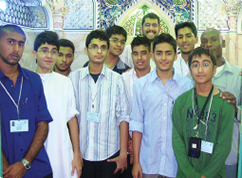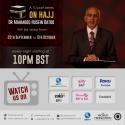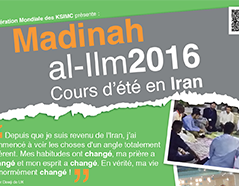Hajj Special link
There are several verses in the Holy Quran that establish the legality of seeking medium (waseelah) to gain divine proximity. These verses clearly reject the belief of the skeptics who reject all waseelah and term Tawassul as Shirk
Click here to read – The Argument of the skeptics against Tawassul
1) In Surah Maaedah (5): 35, Allah orders:
يَأَيُّهَا الَّذِينَ ءَامَنُواْ اتَّقُواْ اللَّهَ وَ ابْتَغُواْ إِلَيْهِ الْوَسِيلَةَ وَ جَاهِدُواْ فىِ سَبِيلِهِ لَعَلَّكُمْ تُفْلِحُون
‘O you who believe! Be careful (of your duty to) Allah and seek means of nearness to Him and strive hard in His way that you may be successful.’
According to this verse every believer is duty bound to seek a medium for attaining proximity to Allah without which achieving the station is impossible. It is notable that the tone and tenor is that of a command and not a recommendation.
Who are the media that the believers should seek to gain divine proximity? As we will see they are none other than the divinely ordained entities. Seeking divine proximity and pleasure through these entities is not Shirk; else the blame for Shirk would lie with Allah.
2) In Surah Nisa (4): 64, Allah declares:
وَلَوْ أَنَّهُمْ إِذ ظَّلَمُواْ أَنفُسَهُمْ جَآؤُوكَ فَاسْتَغْفَرُواْ اللهَ وَاسْتَغْفَرَ لَهُمُ الرَّسُولُ لَوَجَدُواْ اللهَ تَوَّابًا رَّحِيمًا
…and had they, when they were unjust to themselves, come to you and asked forgiveness of Allah and the Apostle had (also) asked forgiveness for them, they would have found Allah Oft-returning (to mercy), Merciful.
There is more than one point in this verse that needs highlighting:
Seeking forgiveness from Allah alone is not sufficient; forgiveness of the Holy Prophet (s.a.w.a.) is a necessary prerequisite. Those who claim that one should approach only Allah and seek all demands from Him alone and not from the creatures have erred in their Tauheed. Seeking help and forgiveness from divinely designated personalities is not against Tauheed. On the contrary as underscored in Surah Nisa (4): 64, it is an inherent condition of Tauheed and if one does not approach these divine personalities along with Allah he has violated the fundamental canons of Tauheed and is liable for censure and condemnation.
The verse in Surah Nisa mentions ‘coming to you’ i.e. Prophet (s.a.w.a.). This implies that Muslims must beseech the Prophet (s.a.w.a.) for forgiveness of their sins. And this is an order for Muslims of all times, not just Muslims in the Prophet’s (s.a.w.a.) era. If the verse was restricted for Muslims in the Prophet’s (s.a.w.a.) era and even then those who were in direct contact with him, only a few Muslims would have benefited from this Quranic injunction and got their sins forgiven; the rest would have been destined for Hellfire only by virtue of being unable to ‘come to the Prophet (s.a.w.a.)’.
An equally notable point is that the verse mentions ‘coming to you’ i.e. Prophet (s.a.w.a.) is in the beginning after which the sinner must seek forgiveness from Allah. Approaching the Prophet (s.a.w.a.) is a prerequisite not just for seeking forgiveness from the Prophet (s.a.w.a.), it is a prerequisite for seeking forgiveness from Allah Himself. Those who say that a dead Prophet (s.a.w.a.) is of no use (Allah forbid) have no way to seek forgiveness from Allah as the Prophet (s.a.w.a.) is the channel through whom the Muslims have been ordered to seek forgiveness.
Clearly, the command to ‘come to the Prophet (s.a.w.a.)’ is like any other command of such a nature. For instance, the 59th verse of Surah Nisa (4) commands the believers:O you who believe! Obey Allah and obey the Apostle and those in authority from among you; then if you quarrel about anything, refer it to Allah and the Apostle…
The Quranic injunction to obey the Prophet (s.a.w.a.) and refer him (s.a.w.a.) in disputes is not restricted to his lifetime and is a command for believers across eras and none can raise an objection that obeying and referring to a ‘dead’ prophet is not possible or that it is tantamount to Shirk. Likewise ‘coming to the Prophet’ for seeking forgiveness of sins is a command applicable to Muslims of all eras and it does not lead to Shirk.
Those who reject a dead prophet and condemn seeking one’s demands and forgiveness of sins from him would do well to refer to the exegesis of reputed scholars of the Ahle Sunnah under 64th verse of Surah Nisa:
The Tafsir of Ibne Kathir, the illustrious scholar who studied under Ibne Taymiyyah is particularly important as far as this verse is concerned. In his Tafseer al-Quran al-Azeem (vol 2, pg 306), under Surah Nisa (4): 64, Ibne Kathir writes:A group of people amongst them Shaikh Abu Nasr b. Al-Sabbaagh documents in his book Al-Shaamil al-Hikaayah Al-Mashhoorah from Al-Utbaa who narrates –
I was seated alongside the Prophet’s (s.a.w.a.) grave when a Bedouin Arab came and said – Salutations on you – O Messenger of Allah! I have heard Allah say – …and had they, when they were unjust to themselves, come to you and asked forgiveness of Allah and the Apostle had (also) asked forgiveness for them, they would have found Allah Oft-returning (to mercy), Merciful.
I have come to you seeking forgiveness for my sins and intercession (for my desires) towards my Lord.
Thereafter, the Arab recited a poem:
‘O, the most exalted among the buried people who improved the worth of the plains and the hillocks. May I sacrifice my life for this grave which is made radiant by you, (the Prophet,) the one who is (an embodiment) of mercy and forgiveness.’
Al-Utbaa narrates – I fell asleep and saw the Prophet (s.a.w.a.) in my sleep. He addressed me – O Utbaa, the Arab was right (in his approach). Give him glad tidings that certainly Allah has forgiven his sins.
The incident is recorded by Th’aalabi Abdul Rahman b. Muhammad in his exegesis – Jawaahir al-Hisaan fi Tafseer al-Quran (vol 3 pg 257)
The incident is recorded in Tafseer-e-Nasafi vol 1, pg 230-231
Al-Nawawi has recorded the incident in Al-Azkaar
Ibne Qudamah al-Maqdisi al-Hanbali has recorded the incident in Al-Moghni vol 3 pg 589
Abu Abdullah Muhammad b. Ahmad b. Abu Bakr al-Ansari al-Qurtubbi in his Tafseer – Al-Jaame le Ahkaam al-Quran (vol 5 p 265) has recorded on the authority of Abu Sadiq who relates from Ali b. Abi Talib (a.s.) – A villager came to us three days after the burial of the Holy Prophet (s.a.w.a.). He placed himself near the Prophet’s (s.a.w.a.) grave, sprinkled its earth over his body and said: ‘O Messenger of Allah (s.a.w.a.), you said and we have heard it from you. You received commands from Allah and we received commands from you, and one of these divine commands was ‘…and had they, when they were unjust to themselves…’ (Surah Nisa (4): 64). It is true that I have wronged myself, therefore, you should pray for my forgiveness. In response to the Bedouin’s imploring he was called out from the grave: There is no doubt that you have been forgiven.’
Thaa’labi Nishapoori Abul Ishaaq Ahmed b. Ibrahim has reported the incident with the same chain of narrators as Qurtubbi in his exegesis – Al-Kashf wa al-Bayaan an Tafseer al-Quran (vol 3 pg 339)
Samhudi has recorded the same incident (which has been recorded by al-Qurtubbi and Thaa’labi) in Wafa al-Wafaa vol 4, tradition 1,361
Jalaal al-Deen Abd al-Rahman Ibn Abu Bakr al-Suyuti has recorded following incident in al-Durr al-Manthoor vol 1 pg 570:Al-Baihaqi has recorded from Abu Harb al-Hilaali who said: A Bedouin came at the door of the mosque of the Prophet (s.a.w.a.). He paused with his luggage, then tied it and entered the mosque until he came opposite the face of the Prophet (s.a.w.a.) and said – May my father and mother be sacrificed on you O Prophet of Allah. I have come to you with the heavy burden of my sins and lapses seeking intercession from you through your Lord. This is because He has ordered us in the revelation of the verse –‘…and had they, when they were unjust to themselves, come to you and asked forgiveness of Allah and the Apostle had (also) asked forgiveness for them, they would have found Allah Oft-returning (to mercy), Merciful.’ (Surah Nisa (4): 64)
Ahmed b. Mustafa al-Muraaghi states in his exegesis – Tafseer al-Muraaghi (vol 5 pg 80) that this verse associates the forgiveness of the Prophet with forgiveness of Allah as a sin is not merely disobedience of Allah but also a violation of the Prophet’s (s.a.w.a.) command which becomes a cause of pain for him. The Prophet (s.a.w.a.) is the one who has delivered the truth and it is necessary for those who oppose the truth (by sinning) express their remorse to the Prophet so that he (s.a.w.a.) may seek forgiveness for them.
3) In Surah Yusuf (12): Verse 97-98:
The sons of Hazrat Yaqoob (a.s.) on regretting their evil deeds approached him and requested him to seek forgiveness from Allah. Allah recounts the incident thus in Surah Yusuf (12): Verse 97
قَالُوا يَا أَبَانَا اسْتَغْفِرْ لَنَا ذُنُوبَنَا إِنَّا كُنَّا خَاطِئِينَ
‘They said: O our father! Ask forgiveness of our faults for us, surely we were sinners.
Hazrat Yaqoob (a.s.) accepted their request (Surah Yusuf (12): Verse 98)
قَالَ سَوْفَ أَسْتَغْفِرُ لَكُمْ رَبِّي إِنَّهُ هُوَ الْغَفُورُ الرَّحِيمُ
He said: I will ask for forgiveness from my Lord, surely He is the Forgiving, the Merciful.’
Hazrat Yaqoob’s (a.s.) sons could have sought forgiveness of Allah on their own without any intervention but chose to approach their father because of his stature. This is another example of the people of a nation approaching their prophet for forgiveness of sins.
4) In Surah Baqarah (2): Verse 37:
فَتَلَقَّى آدَمُ مِن رَّبِّهِ كَلِمَاتٍ فَتَابَ عَلَيْهِ إِنَّهُ هُوَ التَّوَّابُ الرَّحِيمُ
Then Adam received (some) words from his Lord, so He turned to him mercifully; surely He is Oft-returning (to mercy), the Merciful.
What are the words that Adam (a.s.) received from his Lord through the medium of which he was granted forgiveness? Why were these words necessary? Being a prophet, was it not possible for him to get forgiven without the mediation of the words? Does seeking divine proximity and forgiveness through the words amount to Shirk more so for a prophet who knows the definition of Shirk better than us?
The answer to these questions can be found in the first verse of the article (Surah Maaedah (5): Verse 35). Anyone who takes a waseelah ordained by Allah is not guilty of Shirk. Rather he is eligible for a great reward. Shirk is when you take a medium that/who is not divinely ordained.
Under the exegesis of this verse Jalaal al-Deen Abd al-Rahman Ibn Abu Bakr al-Suyuti in al-Durr al-Manthoor has recorded two traditions that are particularly noteworthy.
i) The very first tradition that Suyuti has recorded under this verse (vol 1 pg 58) is on the authority of Umar b. Khattaab, who narrates from the Holy Prophet (s.a.w.a.):
After Adam had sinned he raised his head towards the sky and said: (O Allah), I beseech You that you forgive me for the sake of Muhammad (s.a.w.a.).
Allah: Who is Muhammad?
Adam: When you created me I raised my head towards Your Arsh and saw written – There is no God save Allah and Muhammad is Messenger of Allah. I understood that there was none greater in esteem than Muhammad so much so that you ascribed his name alongside Your Name.
Allah revealed to Adam: O Adam he is the last Prophet from your progeny. Had it not been for him I would not have created you.
This tradition is also recorded by Al-Tabaraani in Al-Mo’jam al-Sagheer, Haakem Neshapuri, Abu Noaim Isfahani, Al-Baihaqi and Ibne Asaakir.
Suyuti records another tradition on page 60 of vol 1 under this verse:
ii) ‘….O Allah I ask you for the sake of Muhammad, Your Servant and his noble position near You that you forgive my sin….Armies of angels greeted Adam (on being forgiven) and said – Greetings to you on Allah’s Forgiveness O Father of Muhammad!.’
5) In Surah Baqarah (2): Verse 89 Allah declares regarding the Jews
And when there came to them a Book from Allah verifying that which they have, and aforetime they used to pray for victory against those who disbelieve, but when there came to them (Prophet) that which they did not recognize, they disbelieved in him; so Allah’s curse is on the unbelievers.
This verse refers to the Jews of Hijaz. Before the Holy Prophet’s (s.a.w.a.) advent, the Jews faced persecution from the infidels of Mecca. The Jews were followers of divine prophets (a.s.) and the infidels were idolaters. The ideological differences heightened the tension between the two groups and affected the Jews in particular as they were heavily outnumbered. To counter the aggression of the infidels, the Jews took the Holy Prophet (s.a.w.a.), whose advent they were eagerly awaiting, as a waseelah and prayed to Allah to grant them victory against their enemies in battle.
The following Sunni scholars have documented this in their books under the exegesis of the aforementioned verse:
a) Tafsir-e-Ibn-Jareer
b) Tafsir-e-Ibne Kathir – Ibne Kathir was a student of Ibne Taymiyyah)
c) Tafsir-e-Fath al-Qadeer of Imam Shawkaani who was of Salafi disposition
d) Hidayah a- Hayara by Hafiz Ibn-e-Qayyim al-Jawziyyah, the student and contemporary of Ibne Taymiyyah
The skeptics might yet argue that that was an act of the Jews and hence cannot be used as evidence for Muslims. To this there are several replies:
i. The action of the Jews is not an aberration or an innovation in light of similar tawassul of Hazrat Adam (a.s.) through the waseelah of the Prophet (s.a.w.a.).
ii. If the action of the Jews was an innovation and impermissible first and foremost Allah or the Holy Prophet (s.a.w.a.) or the companions or the other Salaf or finally the Salafi and Sunni scholars who have documented this in their books should have reprimanded the Jews for their tawassul. Since none has objected to it and only a bunch of skeptics find it objectionable, we can only conclude that tawassul is permissible in Islam and cannot be outlawed, rather the skeptics need to change their definition of Tauheed in line with the views of the Noble Quran, Prophet (s.a.w.a.), companions and the Salaf and the renowned Salafi and Sunni scholars.
The traditions under the exegesis of Surah Baqarah (2): 37 and Surah Baqarah (2): Verse 89 bring forth several important points:
a) Prophet Muhammad (s.a.w.a.) is Allah’s highest ranking creature, higher than the humans, jinn, angels and every other creation. Those who claim that the Prophet (s.a.w.a.) being an ordinary mortal was just like us or only marginally superior to us have erred. He was like us only in the sense that he ate, drank, worked, married, frequented the markets and finally died like us. These so-called flagbearers of Islam and Tauheed are in fact advancing the argument of the apostates of Mecca who rejected the Prophet (s.a.w.a.) because he was just like any other mortal instead of being an angel. Allah replies to the apostates as also Muslims with similar beliefs that even if He had sent forth an angel for man’s guidance he would have sent him in the shape of a mortal.
b) Given his stature near Allah, Prophet Muhammad (s.a.w.a.) was a natural waseelah for the prophets and for the People of the Book before the advent of Islam and for all those who Allah had inspired regarding the stature of Prophet Muhammad (s.a.w.a.). Obviously this does not amount to Shirk as prophets cannot be guilty of such an action and more importantly Allah would have reprimanded them instead of forgiving them.
c) Taking Prophet (s.a.w.a.) as a waseelah before his birth was highly recommended. Taking him as a waseelah during his life time was of course most commendable. It is not clear why taking him as a waseelah after his demise becomes Shirk. Muslims who take Prophet Muhammad (s.a.w.a.) as a waseelah are only following the footsteps of the past prophets (s.a.w.a.). They have recognized the fact that the Prophet (s.a.w.a.) is Allah’s highest ranking creature and can more than anyone else rescue them from the devastating effects of their sins. Just like Adam (a.s.) did not know or care whether Prophet Muhammad (s.a.w.a.) was an angel or a mortal, dead or alive, at the time of seeking waseelah and was more concerned about getting his sin forgiven, those who are anxious for the forgiveness of their sins take the Prophet (s.a.w.a.) as a waseelah and it does not matter that the Prophet (s.a.w.a.) has passed away.
Related News
Ayatul Ghadir (Verses on Ghadir)
A search regarding the Prophet's sermon on the farewell pilgrimage and an exegesis of Quranic verses of Ghadir
Authored by:
Al-Mostafa centre of Islamic researches.
Under the supervision of the supreme Islamic authority
Sayyid Ali-Sistani
The Influence of the Character of Prophet Muhammad (s) on the Spread of Islam during the Meccan Period
Dr. Asghar Muntazir Qa’im
Translated by Jabir Chandoo










